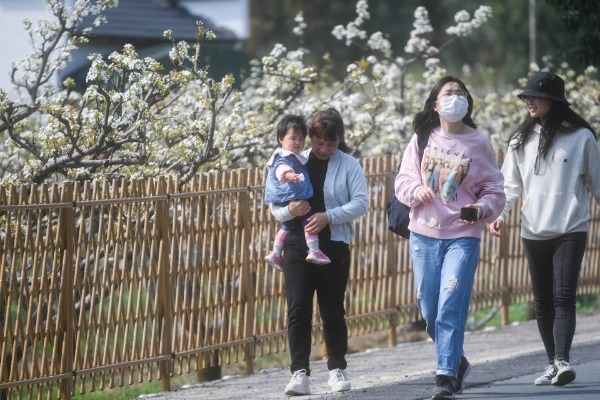Chinese expert predicts pandemic to slow in summer; rebound curve in winter possible
SHANGHAI — While infections and deaths associated with the novel coronavirus continue to rise in many regions, the global pandemic is expected to slow down this summer, said a leading Shanghai expert during a live broadcast on Wednesday.
Zhang Wenhong, leader of the Shanghai team of experts in the treatment of COVID-19 cases, said the pandemic is likely to be brought under control in the coming months. The United States has started to take action against the contagion’s spread, and this will also help with the slowdown of the disease’s spread, he said.
“The next two to three months will be critical for the world to jointly combat the spread of the virus,” Zhang said, as he shared clinical treatment and research experience from Shanghai and throughout China with more than 10,000 overseas counterparts, before fielding questions.
“But I don’t think the virus will be eliminated within this year. There may be a rebound curve this winter and this is hard to predict,” said Zhang, who is also director of the department of infectious diseases at Huashan Hospital in Shanghai.
Hemispheric differences
When invited to share his experience fighting COVID-19 in the city via video linkup with the Consulate General of China in Dusseldorf, Germany, on March 17, Zhang said that he predicted the peak of the global pandemic may occur between April and June, and the number of patients will drop afterward.
Article continues after this advertisement“However, there may still be a small-scale number of patients and another small peak next spring,” said Zhang during the video linkup.
Article continues after this advertisement“We also need to take into consideration that countries in the Northern Hemisphere and the Southern Hemisphere, which experience different seasons, may export cases to one another, and therefore we should be prepared for the contagion to perhaps last one to two years,” he continued.
On Wednesday, during the live broadcast organized by the Chinese American Biopharmaceutical Society, the Beijing Well-Being Foundation and Tsinghua University’s Department of Psychology, Zhang said acute respiratory distress syndrome is common among some of the more serious COVID-19 cases, and it is critical that these patients receive oxygen.
One advantage Shanghai has is adequate mechanical ventilation support, both noninvasive and invasive, he said. So far the overall mortality rate of COVID-19 cases in all affected countries is between 3 and 4 percent, whereas Shanghai’s rate is less than one percent.
When asked about protective measures for healthcare workers, Zhang said it is important that such equipment is provided in adequate quantities.
“Doctors and nurses in Shanghai are also provided with positive pressure masks when they perform medical procedures on patients as this poses a threat of infection through aerosol transmission,” he said.
Zhang said some doctors and nurses treating COVID-19 patients in Shanghai go home to family members.
“In addition to adequate and standard personal protection measures in the hospital, they clean their faces, especially noses and mouths, after arriving home. They live with families but eat separately,” he said.
For more news about the novel coronavirus click here.
What you need to know about Coronavirus.
For more information on COVID-19, call the DOH Hotline: (02) 86517800 local 1149/1150.
The Inquirer Foundation supports our healthcare frontliners and is still accepting cash donations to be deposited at Banco de Oro (BDO) current account #007960018860 or donate through PayMaya using this link.
